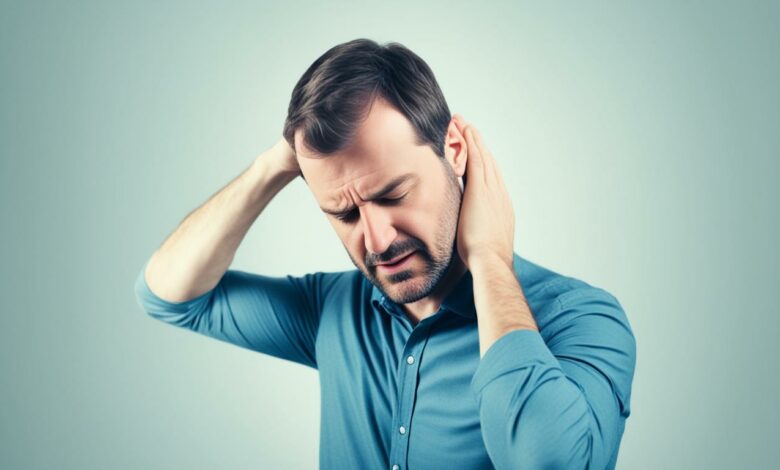Migraine and Stiff Neck: Causes and Relief

Welcome to our article on migraine and stiff neck. If you’ve ever experienced the throbbing pain of a migraine headache combined with the discomfort of a stiff neck, you know how debilitating and frustrating it can be. Luckily, there are effective strategies to relieve both the headache and neck pain. In this article, we will discuss the link between migraines and stiff necks, explore the causes of these symptoms, and provide relief strategies to help you find relief.
It’s important to understand the symptoms of migraines and stiff necks, as well as the common causes for these conditions. Additionally, we will delve into the connection between migraines and stiff necks, particularly focusing on how tension headaches can contribute to both these symptoms. By identifying the root causes, we can better address and manage these issues.
Key Takeaways:
- Migraines and stiff necks often occur together and can significantly impact daily life.
- The link between migraines and stiff necks is often due to tension headaches.
- Common causes of migraines and stiff necks include muscle tension, stress, poor posture, and underlying medical conditions.
- Relief strategies for both migraines and stiff necks include lifestyle changes, relaxation techniques, physical therapy exercises, and potential medical treatments.
- Natural remedies and alternative therapies can also provide relief for migraines and stiff necks.
Understanding Migraines and Stiff Necks
Migraines and stiff necks can cause significant discomfort and disrupt daily activities. In this section, we will explore the symptoms commonly associated with migraines and stiff necks, as well as the underlying causes for these conditions. Understanding these aspects can help individuals identify and manage their symptoms effectively.
Symptoms of Migraines
Migraines are characterized by intense, throbbing headaches that can last for several hours or even days. These headaches often occur on one side of the head and may be accompanied by several other symptoms, such as:
- nausea and vomiting
- sensitivity to light and sound
- visual disturbances, such as flashes or blind spots
Migraine symptoms can vary from person to person, and individuals may experience a combination of these symptoms during an episode.
Symptoms of Stiff Necks
A stiff neck refers to a sensation of discomfort or reduced range of motion in the neck. Common symptoms of a stiff neck include:
- pain or tenderness in the neck area
- difficulty turning or tilting the head
- muscle tightness or spasms
A stiff neck can make it challenging to perform everyday tasks and is often accompanied by other symptoms, such as headaches or shoulder pain. It is crucial to identify the underlying causes of a stiff neck to determine appropriate treatment.
Common Causes of Migraines and Stiff Necks
Both migraines and stiff necks can have various causes. Some common triggers and factors that contribute to these conditions include:
| Migraines | Stiff Necks |
|---|---|
|
|
Identifying the specific triggers and causes for migraines and stiff necks is essential for developing an effective treatment plan and implementing preventive measures.
Next, we will examine the connection between migraines and stiff necks, particularly focusing on how tension headaches can contribute to both these symptoms.
The Connection Between Migraines and Stiff Necks
When it comes to migraines, the pain and discomfort often extend beyond just the head. Many individuals who suffer from migraines also experience a stiff neck, which can exacerbate their symptoms and make the overall condition more debilitating. In this section, we will examine the relationship between migraines and stiff necks, with a particular focus on how tension headaches can contribute to both of these symptoms.
It is important to understand that migraines and stiff necks are not always directly caused by the same underlying factors. However, they often occur together and can mutually exacerbate each other’s effects. Tension headaches, which are a common type of headache often associated with stress and muscle tension, can contribute to both migraines and stiff necks.
During a tension headache, the muscles in the neck and scalp can become tight and contract, leading to pain and discomfort in both areas. This muscle tension can extend to the neck, causing it to become stiff and limiting its range of motion. The resulting stiffness in the neck can then contribute to the intensity and duration of migraines, making them more difficult to manage.
In addition, tension headaches and migraines can share common triggers, such as stress, poor posture, and certain foods or beverages. These shared triggers can further compound the connection between migraines and stiff necks. By addressing these triggers and adopting appropriate strategies for tension headache relief, individuals may be able to alleviate both their migraines and stiff neck symptoms.
To better understand the relationship between migraines, stiff necks, and tension headaches, let’s take a look at the following comparison table:
| Tension Headache | Migraine | Stiff Neck |
|---|---|---|
| Caused by muscle tension and stress. | Severe and throbbing headache often accompanied by nausea and sensitivity to light and sound. | Restricted range of motion in the neck due to muscle tension. |
| Can be triggered by stress, poor posture, and certain foods or beverages. | Triggers can include hormonal changes, certain foods, and environmental factors. | Can be exacerbated by tension headaches and migraines. |
| Can be relieved with relaxation techniques, stress management, and over-the-counter pain medications. | Treatment may involve over-the-counter or prescription medications, lifestyle changes, and avoiding triggers. | Can be alleviated by addressing underlying tension headache and migraine symptoms. |
As you can see from the table, tension headaches, migraines, and stiff necks often overlap in symptoms, triggers, and treatment strategies. By understanding this relationship, individuals can take a comprehensive approach towards managing their migraines and relieving their stiff neck discomfort.
Next, we will explore the specific causes of migraines and stiff necks, shedding light on the underlying factors that contribute to these conditions.
Causes of Migraines and Stiff Necks
Understanding the underlying causes of migraines and stiff necks is crucial for effective management. By identifying the factors that contribute to these symptoms, individuals can take proactive steps to alleviate pain and discomfort.
Muscle tension: One of the primary causes of both migraines and stiff necks is muscle tension. When the muscles in the neck and scalp become tight and constricted, it can lead to headaches and a stiff neck. This tension can be a result of stress, poor posture, or even repetitive motions.
Stress: Emotional or psychological stress can trigger migraines and contribute to neck pain. The body’s physiological response to stress, including muscle tension and increased blood pressure, can exacerbate existing symptoms and lead to new episodes.
Poor posture: Maintaining an incorrect posture for prolonged periods can strain the muscles and ligaments in the neck, leading to stiffness and discomfort. Whether it’s hunching over a desk or craning the neck while using electronic devices, poor posture can contribute to the development of migraines and stiff necks.
Underlying medical conditions: In some cases, migraines and stiff necks may be symptoms of underlying medical conditions. Conditions such as cervical spondylosis, fibromyalgia, and temporomandibular joint disorder (TMJ) can cause chronic headaches and neck pain. It’s important to consult a healthcare professional to rule out any potential underlying conditions.
“Identifying the specific causes of migraines and stiff necks is essential for finding targeted relief. By addressing muscle tension, managing stress, improving posture, and seeking appropriate medical attention, individuals can significantly reduce the frequency and severity of these symptoms.”
Understanding the causes of migraines and stiff necks empowers individuals to make informed decisions about their health and well-being. By implementing preventive measures and adopting appropriate treatments, individuals can effectively manage these symptoms and enjoy a better quality of life.

Relief Strategies for Migraine and Stiff Neck
If you’re experiencing the discomfort of migraines and stiff necks, there are various relief strategies that can help manage your symptoms and provide much-needed relief. These strategies encompass a combination of lifestyle changes, relaxation techniques, physical therapy exercises, and potential medical treatments. By incorporating these approaches into your routine, you can find relief from migraine headaches and alleviate the pain associated with a stiff neck.
Lifestyle Changes
One effective way to manage migraines and stiff necks is by making certain lifestyle adjustments. Consider the following recommendations:
- Avoid triggers: Identify and avoid triggers that may be contributing to your migraines, such as certain foods, bright lights, or strong odors.
- Maintain a regular sleep schedule: Establish consistent sleep patterns to promote better rest and reduce the frequency and intensity of migraines.
- Practice stress management: Incorporate stress-relief activities into your daily routine, such as meditation, deep breathing exercises, or yoga.
- Stay hydrated: Dehydration can worsen migraines, so make sure to drink plenty of water throughout the day.
- Adopt a healthy diet: Eat a well-balanced diet rich in fruits, vegetables, lean protein, and whole grains to support overall health.
Relaxation Techniques
Implementing relaxation techniques can significantly alleviate the discomfort of migraines and reduce tension in the neck. Try the following relaxation techniques:
- Progressive muscle relaxation: This technique involves systematically tensing and relaxing different muscle groups to promote overall relaxation and alleviate muscle tightness.
- Deep breathing exercises: Deep, slow breathing can help relax the body, reduce stress, and alleviate migraine symptoms.
- Hot or cold therapy: Applying a hot or cold compress to the neck area can help reduce inflammation and ease the pain and stiffness associated with migraines and stiff necks.
- Massage therapy: Regular massages can help relax tense muscles, improve circulation, and provide relief from both migraines and stiff necks.
Physical Therapy Exercises
Engaging in specific physical therapy exercises can significantly improve neck mobility and reduce pain. Try incorporating the following exercises into your routine:
- Neck stretches: Gently stretching the neck muscles can help relieve tension and promote flexibility.
- Strength training: Strengthening the muscles surrounding the neck and upper back can provide better support and stability, reducing the frequency and severity of migraines and stiff necks.
- Posture exercises: Practicing proper posture and performing posture correction exercises can help alleviate strain on the neck muscles, reducing the risk of migraines and stiff necks.
Potential Medical Treatments
If lifestyle changes and at-home remedies are not providing sufficient relief, it may be beneficial to explore potential medical treatments for migraines and stiff necks. Consult with a healthcare professional who can recommend the following options:
- Prescription medications: Your doctor may prescribe specific medications to alleviate migraine symptoms or relax the muscles in the neck.
- Botox injections: Botox injections can help reduce the frequency and severity of migraines by temporarily paralyzing the muscles that contribute to headaches.
- Physical therapy: A physical therapist can develop a personalized treatment plan that includes various therapies, such as heat or cold therapy, ultrasound, and exercises tailored to your specific needs.
Remember, everyone is unique, and what works for one person may not work for another. It’s essential to work closely with your healthcare provider to determine the most effective relief strategies for your migraines and stiff neck. By implementing a combination of these approaches, you can find relief and improve your quality of life.
Natural Remedies for Migraine and Stiff Neck Relief
If you’re seeking alternative therapies and natural remedies to alleviate your migraines and stiff neck, there are several options available to you. These holistic approaches can help provide relief without relying solely on medication. Explore the following remedies to find relief:
Herbal Supplements
Herbal supplements have been used for centuries to treat various ailments, including migraines and neck pain. Some commonly recommended supplements include:
- Butterbur: This herb has been found to reduce the frequency and intensity of migraines.
- Feverfew: Feverfew has shown promise in preventing migraines and reducing inflammation.
- Ginger: Known for its anti-inflammatory properties, ginger may help reduce migraines and ease neck pain.
Essential Oils
Essential oils can provide soothing effects and promote relaxation. Try incorporating the following oils into your routine:
- Lavender: Known for its calming properties, lavender oil can help reduce migraine symptoms and relieve tension in the neck.
- Peppermint: Peppermint oil has a cooling effect, which can help alleviate migraines and relax tense neck muscles.
- Eucalyptus: Eucalyptus oil can help reduce inflammation and provide relief for both migraines and stiff necks.
Acupuncture
Acupuncture is an ancient Chinese therapy that involves inserting thin needles into specific points on the body. It has been known to effectively treat migraines by promoting relaxation and relieving tension. Additionally, acupuncture can help improve blood flow and reduce neck pain.
Holistic Approaches
Several other holistic approaches can offer relief for migraines and stiff necks. Consider the following:
“Mindfulness and meditation techniques can help reduce stress, which is a common trigger for migraines and tension in the neck. Yoga and gentle stretching exercises can also promote relaxation and ease muscular tension.”
Furthermore, making lifestyle changes such as improving sleep quality, maintaining a healthy diet, staying hydrated, and managing stress can significantly reduce the frequency and intensity of migraines and alleviate neck pain.

| Remedy | Description |
|---|---|
| Herbal Supplements | Natural herbs like butterbur, feverfew, and ginger can provide relief from migraines and neck pain. |
| Essential Oils | Lavender, peppermint, and eucalyptus oils have calming and anti-inflammatory properties that can alleviate migraines and relax stiff neck muscles. |
| Acupuncture | The ancient practice of acupuncture can promote relaxation, improve blood flow, and reduce migraine symptoms and neck pain. |
| Holistic Approaches | Practicing mindfulness, meditation, yoga, and gentle stretching exercises can reduce stress, promote relaxation, and ease tension in the neck. |
Preventing Migraines and Stiff Necks
Prevention is key to managing migraines and stiff necks. By implementing preventive measures, individuals can reduce the frequency and intensity of these symptoms, improving their overall quality of life.
Stress Management Techniques
Stress can trigger migraines and cause tension in the neck muscles, leading to a stiff neck. Incorporating stress management techniques into your daily routine can help prevent these symptoms. Consider practices such as:
- Deep breathing exercises
- Yoga or meditation
- Regular breaks and relaxation
- Stress-reducing activities like reading or listening to music
By reducing stress levels, you can minimize the likelihood of experiencing migraines and stiff necks.
Ergonomic Adjustments
Poor posture and ergonomic issues can contribute to both migraines and stiff necks. Making adjustments to your workspace and daily habits can significantly reduce the risk of these symptoms. Here are some tips for creating an ergonomic-friendly environment:
- Ensure proper alignment of your desk, chair, and computer
- Use an adjustable chair with good lumbar support
- Position your computer monitor at eye level
- Take regular breaks to stretch and change positions
By maintaining proper ergonomics, you can alleviate strain on your neck and reduce the chances of developing migraines.
Regular Exercise
Engaging in regular physical activity is not only beneficial for overall health but can also help prevent migraines and stiff necks. Exercise promotes blood circulation, reduces muscle tension, and releases endorphins, which act as natural pain relievers. Aim for at least 30 minutes of moderate-intensity exercise most days of the week. Activities like walking, swimming, and cycling can be excellent options.
Maintaining a Healthy Lifestyle
A healthy lifestyle can significantly contribute to preventing migraines and stiff necks. Consider the following habits:
- Eating a well-balanced diet rich in fruits, vegetables, and whole grains
- Staying hydrated and avoiding caffeine and alcohol
- Getting regular and sufficient sleep
- Avoiding smoking and secondhand smoke
These lifestyle choices can help reduce inflammation, improve overall health, and minimize the occurrence of migraines and neck pain.
Implementing these preventive measures can make a significant difference in managing migraines and stiff necks. By taking proactive steps to address stress, maintain good ergonomics, exercise regularly, and adopt a healthy lifestyle, individuals can experience long-term relief from these debilitating symptoms.
Conclusion
In conclusion, this article has delved into the link between migraines and stiff necks, providing valuable insights into the causes and effective relief strategies. By understanding the connection between these symptoms, individuals can take proactive steps towards finding relief from both their migraine headaches and neck pain.
We have explored how migraines and stiff necks often go hand in hand, with tension headaches being a common culprit for the simultaneous occurrence of these symptoms. Additionally, we have discussed various causes including muscle tension, stress, poor posture, and underlying medical conditions.
Fortunately, we have also shared a range of relief strategies for managing migraines and alleviating stiff neck discomfort. From lifestyle changes and relaxation techniques to physical therapy exercises and potential medical treatments, there are many options available to those seeking relief from the debilitating effects of migraine and neck pain.
Lastly, we have highlighted the importance of prevention in managing migraines and stiff necks. By incorporating stress management techniques, ergonomic adjustments, regular exercise, and maintaining a healthy lifestyle, individuals can reduce the frequency and severity of these symptoms, improving overall quality of life.




